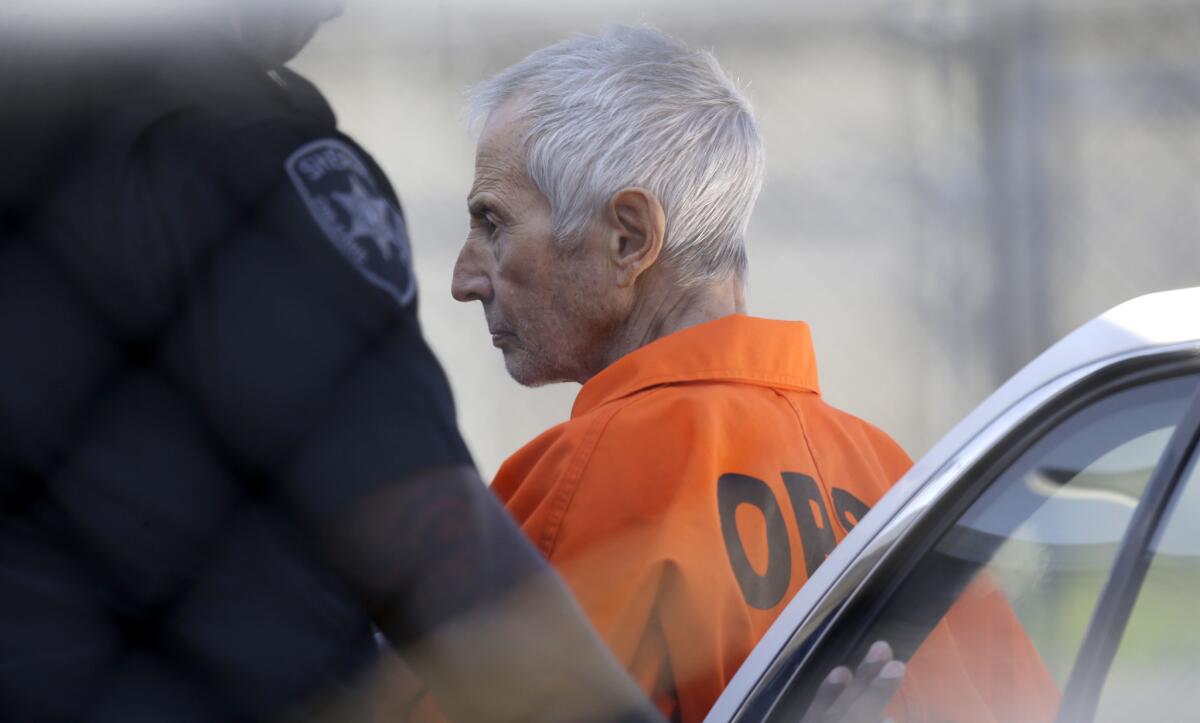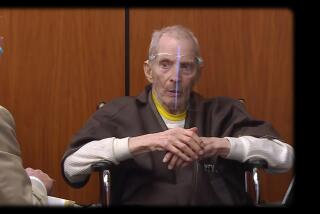Robert Durst reflects on health, politics and murder after plea deal, sentencing
- Share via
NEW ORLEANS — In an exchange with the Los Angeles Times following his sentencing Wednesday, real estate heir Robert Durst reflected on his health, politics in America and the 16-year-old murder case that’s expected to bring him back to Los Angeles this summer.
Durst, 73, was sentenced Wednesday to more than six years in prison on weapons charges in New Orleans as part of a deal that will allow him to be extradited by Aug. 18 to L.A., where he is wanted in connection with the murder of his friend Susan Berman, who was shot in the head at her Benedict Canyon home in 2000.
Last year, Durst wrote to the Times, not to discuss Berman, but instead to wistfully reminisce about his days in L.A. and his love of opera and football.
This time, responding to questions submitted to his attorney, Durst touched on the Berman murder case and the HBO documentary “The Jinx,” which examined his possible connection to her death.
New York City real estate heir Robert Durst leaves a Houston courtroomin 2014.
“I’d rather be going to California on my own, but I’m anxious to get to trial to prove I didn’t kill Susan Berman. You couldn’t print what I think about ‘The Jinx.’ I didn’t kill Susan Berman and I don’t know who did.”
He said he keeps busy by reading a lot. On politics and the president election, Durst kept it simple. “I follow politics. It’s a mess”
Were there places in L.A. that he liked best? “SCI-Arc”, he replied.
And his health? “On a scale of 1-10 my health is a zero,” Durst wrote. “I have balance and memory problems, but the U.S. Marshal’s office has provided very good medical care.”
His last comments were echoed by what he said at his sentencing Wednesday.
“I’ve been waiting to get to California for a year so I can state my not guilty,” Durst told the judge. “If there’s anything you can do to speed up that process, I would truly, truly appreciate it. I am not guilty of murdering Susan Berman.”
At sentencing, U.S. District Judge Kurt Engelhardt endorsed Durst’s defense team’s recommendation that he be transferred to Terminal Island, a low-security federal prison with medical facilities near San Pedro.
In a legal filing this week, attorneys cited Durst’s “advanced age and poor health” in requesting he be housed at Terminal Island.
Durst’s lead defense attorney, Dick DeGuerin, called the plea deal “a compromise.” Part of the deal is that prosecutors won’t share their case until after Durst arrives, which frustrates the defense. But the Houston-based attorney noted “we got a lot out of it: he won’t be prosecuted anywhere else but California, he won’t be prosecuted in New York or sent to Angola,” Louisiana’s largest and most notorious prison.
Durst was a suspect in the 1982 disappearance of wife Kathy Durst in New York, but was never charged.
“This case is really about the Susan Berman murder,” DeGuerin said.
“We need to get to trial.”

Robert Durst in New Orleans in 2015.
Once they do, Durst’s health will likely play a major role.
“He’s stable but he has balance problems. He was examined as recently as yesterday having to do with his neck problems, the spinal fusion of his neck. He still has the hydrocephalus [water on the brain] which is probably causing the balance problems,” DeGuerin said, describing Durst as “frail” with “some memory problems.”
Could that impact his ability to function at trial?
“Yes it could,” DeGuerin said. “Memory is an important facet of being able to defend yourself.”
More to Read
Sign up for Essential California
The most important California stories and recommendations in your inbox every morning.
You may occasionally receive promotional content from the Los Angeles Times.














